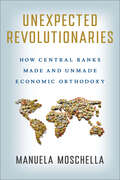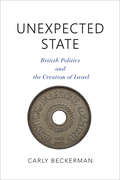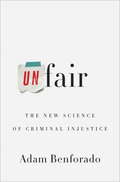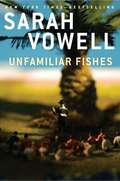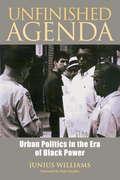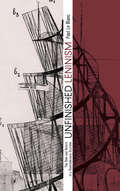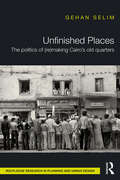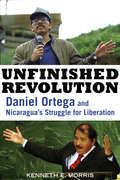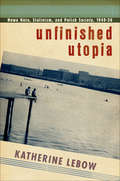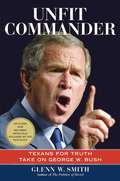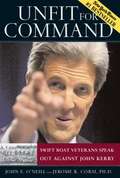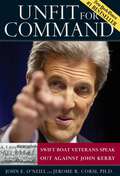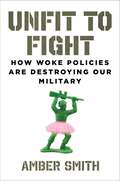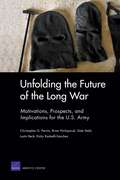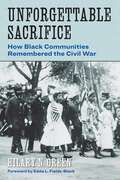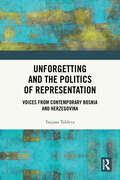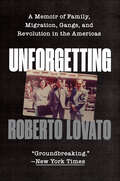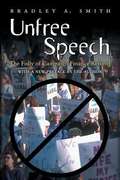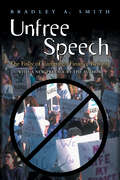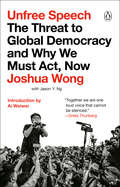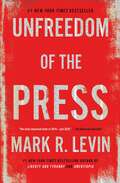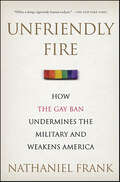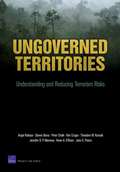- Table View
- List View
Unexpected Revolutionaries: How Central Banks Made and Unmade Economic Orthodoxy (Cornell Studies in Money)
by Manuela MoschellaIn Unexpected Revolutionaries, Manuela Moschella investigates the institutional transformation of central banks from the 1970s to the present. Central banks are typically regarded as conservative, politically neutral institutions that uphold conventional macroeconomic wisdom. Yet in the wake of the 2008 global financial crisis and the 2020 COVID-19 crisis, central banks have upended observer expectations by implementing largely unknown and unconventional monetary policies. Far from abiding by well-established policy playbooks, central banks now engage in practices such as providing liquidity support for a wide range of financial institutions and quantitative easing. They have even stretched the remit of monetary policy into issues such as inequality and climate change. Moschella argues that the political nature of central banks lies at the heart of these transformations. While formally independent, central banks need political support to justify their policies and powers, and to obtain it, they carefully manage their reputation among their audienceselected officials, market actors, and citizens. Challenged by reputational threats brought about by twenty-first-century recessionary and deflationary forces, central banks such as the Federal Reserve System and the European Central Bank strategically deviated from orthodox monetary policies to preempt or manage political backlash and to regain public trust. Central banks thus evolved into a new role only in coordination with fiscal authorities and on the back of public contestation. Eye-opening and insightful, Unexpected Revolutionaries is necessary reading for discussions on the future of the neoliberal macroeconomic regime, the democratic oversight of monetary policymaking, and the role that central banks canor cannotplay in our domestic economies.
Unexpected State: British Politics and the Creation of Israel (Indiana Series in Middle East Studies)
by Carly BeckermanThis provocative historical reassessment sheds new light on the decisions of British politicians that led to the creation of Israel.Separating myth and propaganda from historical fact, Carly Beckerman explores how elite political battles in London inadvertently laid the foundations for the establishment of the State of Israel. Drawing on foreign policy analysis and previously unexamined archival sources, Unexpected State examines the strategic interests, international diplomacy, and political maneuvering in Westminster that determined the future of Palestine. Contrary to established literature, Beckerman shows how British policy toward the territory was dominated by domestic and international political battles that had little to do with Zionist or Palestinian interests. Instead, the policy process was aimed at resolving issues such as coalition feuds, party leadership battles, spending cuts, and riots in India. Considering detailed analysis of four major policy-making episodes between 1920 and 1948, Unexpected State interrogates key Israeli and Palestinian narratives and provides fresh insight into the motives and decisions behind policies that would have global implications for decades to come.
Unfair: The New Science of Criminal Injustice
by Adam Benforado"A law professor sounds an explosive alarm on the hidden unfairness of our legal system." --Kirkus Reviews, starred A child is gunned down by a police officer; an investigator ignores critical clues in a case; an innocent man confesses to a crime he did not commit; a jury acquits a killer. The evidence is all around us: Our system of justice is fundamentally broken. But it's not for the reasons we tend to think, as law professor Adam Benforado argues in this eye-opening, galvanizing book. Even if the system operated exactly as it was designed to, we would still end up with wrongful convictions, trampled rights, and unequal treatment. This is because the roots of injustice lie not inside the dark hearts of racist police officers or dishonest prosecutors, but within the minds of each and every one of us. This is difficult to accept. Our nation is founded on the idea that the law is impartial, that legal cases are won or lost on the basis of evidence, careful reasoning and nuanced argument. But they may, in fact, turn on the camera angle of a defendant's taped confession, the number of photos in a mug shot book, or a simple word choice during a cross-examination. In Unfair, Benforado shines a light on this troubling new field of research, showing, for example, that people with certain facial features receive longer sentences and that judges are far more likely to grant parole first thing in the morning. Over the last two decades, psychologists and neuroscientists have uncovered many cognitive forces that operate beyond our conscious awareness. Until we address these hidden biases head-on, Benforado argues, the social inequality we see now will only widen, as powerful players and institutions find ways to exploit the weaknesses of our legal system. Weaving together historical examples, scientific studies, and compelling court cases--from the border collie put on trial in Kentucky to the five teenagers who falsely confessed in the Central Park Jogger case--Benforado shows how our judicial processes fail to uphold our values and protect society's weakest members. With clarity and passion, he lays out the scope of the legal system's dysfunction and proposes a wealth of practical reforms that could prevent injustice and help us achieve true fairness and equality before the law.From the Hardcover edition.
Unfamiliar Fishes
by Sarah VowellIn Unfamiliar Fishes, Sarah Vowell argues that 1898 might be a year just as defining, when, in an orgy of imperialism, the United States annexed Hawaii, Puerto Rico, and Guam, and invaded first Cuba, then the Philippines, becoming an international superpower practically overnight. Vowell lights out to discover the off, emblematic, and exceptional history of the fiftieth state, and in so doing finds America, warts and all.
Unfinished Agenda
by Tom Hayden Junius WilliamsUnfinished Agenda offers an inside look at the Black Power Movement that emerged during the Civil Rights Movement of the sixties. A political memoir that teaches grass-roots politics and inspires organizing for real change in the Age of Obama, this book will appeal to readers of black history, Occupy Wall Street organizers, and armchair political advocates. Based on notes, interviews, and articles from the 1950s to present day, Junius Williams's inspiring memoir describes his journey from young black boy facing prejudice in the 1950s segregated South to his climb to community and political power as a black lawyer in the 1970s and 80s in Newark, New Jersey. Accompanied by twenty-two compelling photographs highlighting key life events, Unfinished Agenda chronicles the turbulent times during the Civil Rights Movement and Williams's participation every step of the way including his experiences on the front lines of racial riots in Newark and the historic riot in Montgomery, Alabama with Dr. Martin Luther King Jr. Williams speaks of his many opportunities and experiences--beginning with his education at Amherst College and Yale Law School, his travel to Uganda and Kenya, and working in Harlem. His passion for fighting racism ultimately led him to many years of service in politics in Newark, New Jersey as a community organizer and leader. Williams advocates for renewed community organizing and voting for a progressive party to carry out the "Unfinished Agenda" the Black Power Movement outlined in America during the 60s and early 70s for empowerment of the people.From the Trade Paperback edition.
Unfinished Leninism
by Paul Le BlancPraise for Paul Le Blanc's Lenin and the Revolutionary Party:"A work of unusual strength and coherence, inspired not by academic neutrality but by the deep conviction that there is much to learn from the actual ideas and experiences of Lenin." -Michael LöwyAs a leader of the Russian Revolution, Vladimir Lenin was perhaps the greatest revolutionary of the twentieth century. These clearly written essays offer an account of his life and times, a lively view of his personality, and a stimulating engagement with his ideas.Paul Le Blanc is a professor of history at La Roche College and has written widely on radical movements.
Unfinished Places (Re)making Cairo’s Old Quarters: The Politics Of (re)making Cairo's Old Quarters
by Gehan SelimThe Emerging Politics of (Re) making Cairo's Old Quarters examines postcolonial planning practices that aimed to modernise Cairo’s urban spaces. The author examines the expanding field of postcolonial urbanism by linking the state’s political ideologies and systems of governance with methods of spatial representations that aimed to transform the urban realm in Cairo. Adopting an interdisciplinary approach, the study draws on planning, history and politics to develop a distinctive account of postcolonial planning in Cairo following Egypt’s 1952 revolution. The book widely connects the ideological role of a different type of politicised urbanism practised during the days of Nasser, Sadat and Mubarak and the overarching policies, institutions and attitudes involved in the visions for (re) building a new nation in Egypt. By examining the notion of remaking urban spaces, the study interprets the ambitions and powers of state policies for improving the spatial qualities of Cairo’s old districts since the early 20th century. These acts are situated in their spatial, political and historical contexts of Cairo’s heterogeneous old quarters and urban spaces particularly the remaking of one of the city’s older quarts named Bulaq Abul Ela established during the Ottoman rule in the thirteenth century. It therefore writes, in a chronological sequence, a narrative through time and space connecting various layers of historical and contemporary political phases for remaking Bulaq. The endeavor is to explain this process from a spatial perspective in terms of the implications and consequences not only on places, but also on the people’s everyday practices. By deeply investigating the problems and consequences; the strengths and weaknesses; and the state’s reliability to achieve the remaking objectives, the book reveals evidence that shifting forms of governance had anchored planning practices into a narrow path of creativity and responsive planning.
Unfinished Revolution: Daniel Ortega and Nicaragua's Struggle for Liberation
by Kenneth E. MorrisThe first full-length biography of Daniel Ortega in any language, this exhaustive account draws from a wealth of untapped sources to tell the story of Nicaragua's continuing struggle for liberation through the prism of the Revolution's most emblematic yet enigmatic hero. It traces Ortega's life from his childhood in Nicaragua's mountainous mining region, where his parents instilled in him a hatred of Yankee imperialism, through a current presidential administration that has many of the earmarks of the authoritarianism he opposed in others. In between, it shows him as a teenager caught up in political agitation, a political prisoner locked in a jail cell for seven years, a strategist and fighter of the Revolution, a leader in the new republic, and a behind-the-scenes powerbroker plotting his own return to power. The portrait that emerges is of a man who wants the best for his country--and often gets it--yet also one prone to making questionable compromises in pursuit of his lofty ambitions.
Unfinished Utopia: Nowa Huta, Stalinism, and Polish Society, 1949–56
by Katherine LebowUnfinished Utopia is a social and cultural history of Nowa Huta, dubbed Poland's "first socialist city" by Communist propaganda of the 1950s. Work began on the new town, located on the banks of the Vistula River just a few miles from the historic city of Kraków, in 1949. By contrast to its older neighbor, Nowa Huta was intended to model a new kind of socialist modernity and to be peopled with "new men," themselves both the builders and the beneficiaries of this project of socialist construction. Nowa Huta was the largest and politically most significant of the socialist cities built in East Central Europe after World War II; home to the massive Lenin Steelworks, it epitomized the Stalinist program of forced industrialization that opened the cities to rural migrants and sought fundamentally to transform the structures of Polish society.Focusing on Nowa Huta's construction and steel workers, youth brigade volunteers, housewives, activists, and architects, Katherine Lebow explores their various encounters with the ideology and practice of Stalinist mobilization by seeking out their voices in memoirs, oral history interviews, and archival records, juxtaposing these against both the official and unofficial transcripts of Stalinism. Far from the gray and regimented landscape we imagine Stalinism to have been, the fledgling city was a colorful and anarchic place where the formerly disenfranchised (peasants, youth, women) hastened to assert their leading role in "building socialism"-but rarely in ways that authorities had anticipated.
Unfit Commander
by Glenn W. SmithEver since George W. Bush began running for public office in the 1990s, questions have been raised in the public eye about his service in the Air National Guard during the late 1960s and early 1970s -- when countless American soldiers (John Kerry among them) were serving heroically in Vietnam. By the time of the presidential race in 2000, it was clear that Bush's record of service contained several troubling gaps -- especially in the period between May 1972 and May 1973, when Bush was supposed to have transferred to the Alabama Air National Guard. In early 2004, as the election season heated up, the White House bowed to pressure and released a host of documents related to Bush's service, promising that this disclosure would put the matter to rest. Yet the documents raised as many new questions as they answered. Now, for the first time, the comprehensive written record of George W. Bush's military career -- more than 250 pages in all -- is presented in book form. In his introduction and commentary, longtime activist and author Glenn W. Smith, the founder of Texans for Truth, highlights such questions as: How did Bush secure his acceptance into the National Guard, despite a long waiting list? Did his father pull strings, as some have alleged, to help him avoid the draft? Why did Bush suddenly stop performing his Guard service from mid-1972 to mid-1973, as the documents show? Did Bush truly perform sufficient duties to qualify for the honorable discharge he received, or was he given special consideration? In the summer of 1972, Bush failed to appear for his required physical, and was consequently suspended from flying. Why didn't he take the physical? And why has he claimed that he kept flying for the Guard? If Bush was present at the National Guard base in Montgomery, Alabama, during the disputed period, why has no one accepted the White House's pleas to step forward and confirm that he was there? And how do the now-discredited "Killian documents," first aired on 60 Minutes in September 2004, affect our understanding of Bush's Guard status? Unfit Commander also tracks the Bush administration's efforts to defuse the controversy, from Bush's own claim that he "put in his time," to the White House's record of unyielding non-denial denials despite the persistent questioning of the press. And at the heart of the book are the documents themselves: from Bush's agreement that "failure to satisfactorily complete [full] pilot training will result in my being discharged," to his supervisor's statement that "Lt Bush has not been observed at this unit" during the critical period. A provocative exploration of this commander in chief's spotty record of personal military service, Unfit Commander is the place to start for anyone interested in getting at the truths of President Bush's character.
Unfit For Command: Swift Boat Veterans Speak Out Against John Kerry
by Jerome R. Corsi John E. O'NeillJohn O'Neill was the naval officer who took over John Kerry's Swift Boat in the muddy waters of Vietnam. What he learned convinced him - and convinced the majority of veterans who served directly with Kerry - that John Kerry was and is unfit for command as a naval officer, let alone as commander in chief of the United States. In this stunning new book, John O'Neill and his coauthor Dr. Jerome Corsi (an expert on the anti-Vietnam War movement) interviewed dozens of veterans who served with Kerry and meticulously documented a shameful record of betrayal and deception on the part of John Kerry. In Unfit for Command you'll learn: How two of John Kerry's three Purple Heart decorations resulted from self-inflicted wounds, not suffered under enemy fire Why John Kerry's third Purple Heart "fanny wound" was the highlight of his much touted "no man left behind" Bronze Star How John Kerry turned the tragic death of a father and small child in a Vietnamese fishing boat into an act of "heroism" by filing a false report on the incident How John Kerry entered an abandoned Vietnamese village, slaughtered the domestic animals owned by the civilians, and burned down their homes with his Zippo lighter How John Kerry's reckless behavior convinced his colleagues that he had to go - becoming the only Swift Boat veteran to serve only four months in Vietnam How, as a leader of Vietnam Veterans Against the War, John Kerry attended a meeting where plans were discussed to assassinate prominent United States senators who supported the war How Kerry met secretly with Communist delegates at the Paris Peace Conference during the Vietnam War, and why some believe he violated the Uniform Code of Military Justice and federal law Based on detailed interviews with Swift Boat veterans who served in Vietnam with John Kerry and on recently released FBI surveillance reports of John Kerry's antiwar activities, Unfit for Command is a shocking indictment of a politician who slandered his fellow veterans, danced on the edge of treason, and has shamelessly exaggerated his own war service for political ends.
Unfit For Command: Swift Boat Veterans Speak Out Against John Kerry
by Jerome R. Corsi John E. O'Neill"What sort of combination of hypocrite and paradox is John Kerry?" ask the authors in this heated critique of the Democratic presidential candidate’s Vietnam-era military service and antiwar activism. O’Neill, a lawyer and swift boat veteran, and Corsi, an expert on Vietnam antiwar movements, argue that Kerry misrepresented his wartime exploits and is therefore incompetent to serve as commander in chief. Buttressed by interviews with Navy veterans who patrolled Vietnam’s waters, some along with Kerry, the book claims he exaggerated minor injuries, self-inflicted others, wrote fictitious diary entries and filed "phony" reports of his heroism under fire-all in a calculated quest to secure career-enhancing combat medals. They also maintain that Kerry, whom they call a "moral coward," committed atrocities that alarmed his peers and superior officers during his four-month tour of duty. Yet his activities on behalf of the Vietnam Veterans Against the War clearly raises the authors’ hackles the most, and they present Kerry’s post-war actions as additional, damning evidence of his "total unfitness," claiming that his testimony against the war "caused more deaths and prolonged the war in Vietnam by undermining support at home and contributing directly to a Vietnamese Communist victory." The battle that lies at the heart of this book is the decades-old feud between antiwar veterans and their my-country-right-or-wrong counterparts. The authors’ conservative take on the war is palpable: the U.S. military failed to unleash "massive, indiscriminate bombing" to force North Vietnam’s capitulation; the conflict was a struggle against communism, not a civil war; and the dissenting soldiers undermined homefront morale. Consequently, this overwrought and repetitive polemic seethes with a resentment that compromises the otherwise eyebrow-raising testimonies. Further, without access to Kerry’s full military and medical records, the authors rely heavily on 35-year-old recollections and recent Kerry biographies by Douglas Brinkley and a Boston Globe reporting team. Those looking for a thorough, unbiased investigation into Kerry’s wartime record would do best to wait for more objective, methodical chroniclers who have access to the relevant documents.
Unfit to Fight: How Woke Policies Are Destroying Our Military
by Amber SmithOur Woke Military Could Lose the Next WarWokeness used to be an annoying distraction in the U.S. military. Now it is a major threat to national security.Faster than most of us thought possible, our military has become a woke, dysfunctional bureaucracy focused not on winning wars but on identity politics, gender ideology, climate change, and other favored causes of the leftist elite.Don&’t think that China isn&’t watching. Don&’t think that Russia, Iran, and North Korea haven&’t noticed.But so has Amber Smith, a former U.S. Army combat helicopter pilot and Deputy Assistant to the Secretary of Defense. In her riveting new book, Unfit to Fight, she sounds the alarm that our military and our nation are at grave risk.In Unfit to Fight, you&’ll learn:Why the military should not &“reflect American society,&” but be a select group of lethal professionalsHow the Pentagon rewards lowered standards for the sake of &“diversity&”Why failure often leads to promotion—if you have the right friendsWhy a return to combat merit, battlefield mission, and trust in leadership are essential—or we will lose our next warElections, as they say, have consequences, and catastrophic damage to national security is among the most important. Amber Smith&’s Unfit to Fight needs to be in the hands of everyone who cares about our military and our survival as a nation.
Unfolding the Future of the Long War: Motivations, Prospects, and Implications for the U. S. Army
by Brian Nichiporuk Christopher G. Pernin Justin Beck Dale Stahl Ricky Radaelli-SanchezThe United States is currently engaged in a military effort that has been characterized as the "long war." This study explores the concept of long war and identifies ways in which it might unfold as well as the implications for the Army and the U.S. military more generally. This report uses the generation of either "trajectories" or alternative paths in which the long war might unfold to explore the implications for the U.S. military.
Unforgettable Sacrifice: How Black Communities Remembered the Civil War (Reconstructing America)
by Hilary N. GreenRediscover the Civil War through the voices that refused to be silencedUnforgettable Sacrifice offers a groundbreaking exploration into the heart of African American memory of the Civil War, challenging conventional narratives and revealing a rich history preserved through oral traditions and communal efforts. Through extensive archival research and stories shared on the porches of African American families, Hilary Green provides a detailed examination of how diverse Black communities across the United States have actively preserved and contested the memory of the Civil War, from the nineteenth century to the present.By rejecting the reduction of their experiences to mere footnotes in history, African Americans have established a vibrant commemorative culture that respects the complexity of their ancestors’ sacrifices and struggles. From the rural landscapes of Black Pennsylvanians to the heart of emancipated communities in the South, Green connects the narratives of those who not only fought on battlefields but also in the realms of memory and heritage, ensuring their stories of resilience, courage, and patriotism are remembered.Unforgettable Sacrifice brings to light the untold stories of ordinary African Americans who took extraordinary steps in remembrance and resistance. By refusing to accept diluted narratives and lies, they have ensured the legacy of the Civil War includes the end of slavery, the valor of Black soldiers and civilians, and the ongoing struggle for democracy and full citizenship.This book is a testament to the enduring power of memory and the steadfast spirit of the African American community. It is an indispensable addition to the libraries of scholars, general readers, and descendant communities alike, offering new perspectives on the lasting impact of the Civil War on American identity and the persistent pursuit of justice and equality.
Unforgetting and the Politics of Representation: Voices from Contemporary Bosnia and Herzegovina
by Tatjana TakševaBased on interviews and conversations in the Bosnian Federation with women survivors of war rape, children born of rape and armed conflict, leaders of NGOs who work with survivors, and people who lived through the war and who experienced it in different ways, this book challenges one dimensional representations of the Yugoslav war and subsequent peacebuilding processes. Relying on feminist ethnography and autoethnography, this volume offers systematic engagement with the politics of representation of Bosnia and survivors of war in post-war journalism and scholarship.Through rich and varied individual experiences of wartime violence and recovery that go beyond simple ‘us’ versus ‘them’ narratives of ethnic identity and intolerance, the book shows how public and private, individual and collective discourses actively shape one another and contribute to complex forms of engagement in recovery, healing and rebuilding. The author draws upon archival material to undermine the fetishization of ethnicity as a determining category that often underpins journalistic and scholarly accounts of post-war Bosnia. By retracing and repairing separations between individual and collective remembrance, and by complicating linear and monolithic conception of this process, the narratives in the book actively contest reductionist and instrumentalist accounts of the civil war in Bosnia.The book will appeal to scholars across the social sciences with interest in memory, peacebuilding, national identity, gendered violence and processes of reconciliation
Unforgetting: A Memoir of Family, Migration, Gangs, and Revolution in the Americas
by Roberto LovatoAn LA Times Best Book of the Year • A New York Times Editors' Pick • A Newsweek 25 Best Fall Books • A The Millions Most Anticipated Book of the Year"Gripping and beautiful. With the artistry of a poet and the intensity of a revolutionary, Lovato untangles the tightly knit skein of love and terror that connects El Salvador and the United States." —Barbara Ehrenreich, author of Natural Causes and Nickel and DimedAn urgent, no-holds-barred tale of gang life, guerrilla warfare, intergenerational trauma, and interconnected violence between the United States and El Salvador, Roberto Lovato’s memoir excavates family history and reveals the intimate stories beneath headlines about gang violence and mass Central American migration, one of the most important, yet least-understood humanitarian crises of our time—and one in which the perspectives of Central Americans in the United States have been silenced and forgotten. The child of Salvadoran immigrants, Roberto Lovato grew up in 1970s and 80s San Francisco as MS-13 and other notorious Salvadoran gangs were forming in California. In his teens, he lost friends to the escalating violence, and survived acts of brutality himself. He eventually traded the violence of the streets for human rights advocacy in wartime El Salvador where he joined the guerilla movement against the U.S.-backed, fascist military government responsible for some of the most barbaric massacres and crimes against humanity in recent history. Roberto returned from war-torn El Salvador to find the United States on the verge of unprecedented crises of its own. There, he channeled his own pain into activism and journalism, focusing his attention on how trauma affects individual lives and societies, and began the difficult journey of confronting the roots of his own trauma. As a child, Roberto endured a tumultuous relationship with his father Ramón. Raised in extreme poverty in the countryside of El Salvador during one of the most violent periods of its history, Ramón learned to survive by straddling intersecting underworlds of family secrets, traumatic silences, and dealing in black-market goods and guns. The repression of the violence in his life took its toll, however. Ramón was plagued with silences and fits of anger that had a profound impact on his youngest son, and which Roberto attributes as a source of constant reckoning with the violence and rebellion in his own life.In Unforgetting, Roberto interweaves his father’s complicated history and his own with first-hand reportage on gang life, state violence, and the heart of the immigration crisis in both El Salvador and the United States. In doing so he makes the political personal, revealing the cyclical ways violence operates in our homes and our societies, as well as the ways hope and tenderness can rise up out of the darkness if we are courageous enough to unforget.
Unfree Speech: The Folly of Campaign Finance Reform
by Bradley A. SmithAt a time when campaign finance reform is widely viewed as synonymous with cleaning up Washington and promoting political equality, Bradley Smith, a nationally recognized expert on campaign finance reform, argues that all restriction on campaign giving should be eliminated. In Unfree Speech, he presents a bold, convincing argument for the repeal of laws that regulate political spending and contributions, contending that they violate the right to free speech and ultimately diminish citizens' power. Smith demonstrates that these laws, which often force ordinary people making modest contributions of cash or labor to register with the Federal Election Commission or various state agencies, fail to accomplish their stated objectives. In fact, they have worked to entrench incumbents in office, deaden campaign discourse, burden grassroots political activity with needless regulation, and distance Americans from an increasingly professional, detached political class. Rather than attempting to plug "loopholes" in campaign finance law or instituting taxpayer-financed campaigns, Smith proposes a return to core First Amendment values of free speech and an unfettered right to engage in political activity. Smith finds that campaign contributions have little corrupting effect on the legislature and shows that an unrestrained system of contributions and spending actually enhances equality. More money, not less, is needed in the political system, Smith concludes. Unfree Speech draws upon constitutional law and historical research to explain why campaign finance regulation is doomed and to illustrate the potentially drastic costs of efforts to make it succeed. Whatever one thinks about the impact of money on electoral politics, no one should take a final stand without reading Smith's controversial and important arguments.
Unfree Speech: The Folly of Campaign Finance Reform
by Samantha SellingerAt a time when campaign finance reform is widely viewed as synonymous with cleaning up Washington and promoting political equality, Bradley Smith, a nationally recognized expert on campaign finance reform, argues that all restriction on campaign giving should be eliminated. In Unfree Speech, he presents a bold, convincing argument for the repeal of laws that regulate political spending and contributions, contending that they violate the right to free speech and ultimately diminish citizens' power. Smith demonstrates that these laws, which often force ordinary people making modest contributions of cash or labor to register with the Federal Election Commission or various state agencies, fail to accomplish their stated objectives. In fact, they have worked to entrench incumbents in office, deaden campaign discourse, burden grassroots political activity with needless regulation, and distance Americans from an increasingly professional, detached political class. Rather than attempting to plug "loopholes" in campaign finance law or instituting taxpayer-financed campaigns, Smith proposes a return to core First Amendment values of free speech and an unfettered right to engage in political activity. Smith finds that campaign contributions have little corrupting effect on the legislature and shows that an unrestrained system of contributions and spending actually enhances equality. More money, not less, is needed in the political system, Smith concludes. Unfree Speech draws upon constitutional law and historical research to explain why campaign finance regulation is doomed and to illustrate the potentially drastic costs of efforts to make it succeed. Whatever one thinks about the impact of money on electoral politics, no one should take a final stand without reading Smith's controversial and important arguments.
Unfree Speech: The Threat to Global Democracy and Why We Must Act, Now
by Joshua WongAn urgent manifesto for global democracy from Joshua Wong, the 23-year-old phenomenon leading Hong Kong's protests - and Nobel Peace Prize nominee - with an introduction by Ai WeiweiWith global democracy under threat, we must act together to defend out rights: now.When he was 14, Joshua Wong made history. While the adults stayed silent, Joshua staged the first-ever student protest in Hong Kong to oppose National Education -- and won.Since then, Joshua has led the Umbrella Movement, founded a political party, and rallied the international community around the anti-extradition bill protests, which have seen 2 million people -- more than a quarter of the population -- take to Hong Kong's streets. His actions have sparked worldwide attention, earned him a Nobel Peace Prize nomination, and landed him in jail twice.Composed in three parts, Unfree Speech chronicles Joshua's path to activism, collects the letters he wrote as a political prisoner under the Chinese state, and closes with a powerful and urgent call for all of us globally to defend our democratic values.When we stay silent, no one is safe. When we free our speech, our voice becomes one.
Unfreedom of the Press
by Mark R. LevinFrom five-time #1 New York Times bestselling author, FOX News star, and radio host Mark R. Levin comes a groundbreaking and enlightening book that shows how the great tradition of the American free press has degenerated into a standardless profession that has squandered the faith and trust of the American public, not through actions of government officials, but through its own abandonment of reportorial integrity and objective journalism. <P><P>Unfreedom of the Press is not just another book about the press. Levin shows how those entrusted with news reporting today are destroying freedom of the press from within: “not government oppression or suppression,” he writes, but self-censorship, group-think, bias by omission, and passing off opinion, propaganda, pseudo-events, and outright lies as news. <P><P>With the depth of historical background for which his books are renowned, Levin takes the reader on a journey through the early American patriot press, which proudly promoted the principles set forth in the Declaration of Independence and the Constitution, followed by the early decades of the Republic during which newspapers around the young country were open and transparent about their fierce allegiance to one political party or the other. <P><P>It was only at the start of the Progressive Era and the twentieth century that the supposed “objectivity of the press” first surfaced, leaving us where we are today: with a partisan party-press overwhelmingly aligned with a political ideology but hypocritically engaged in a massive untruth as to its real nature. <P><b>A New York Times Bestseller</b>
Unfriendly Fire: How the Gay Ban Undermines the Military and Weakens America
by Nathaniel FrankWhen the "don't ask, don't tell" policy emerged as a political compromise under Bill Clinton in 1993, it only ended up worsening the destructive gay ban that had been on the books since World War II. Drawing on more than a decade of research and hundreds of interviews, Nathaniel Frank exposes the military's policy toward gays and lesbians as damaging and demonstrates that "don't ask, don't tell" must be replaced with an outright reversal of the gay ban. Frank is one of the nation's leading experts on gays in the military, and in his evenhanded and always scrupulously documented chronicle, he reveals how the ban on open gays and lesbians in the U.S. military has greatly increased discharges, hampered recruitment, and—contrary to the rationale offered by proponents of the ban—led to lower morale and cohesion within military ranks. Frank does not shy away from tackling controversial issues, and he presents indisputable evidence showing that gays already serve openly without causing problems, and that the policy itself is weakening the military it was supposed to protect. In addition to the moral pitfalls of the gay ban, Frank shows the practical damage it has wrought. Most recently, the discharge of valuable Arabic translators (who happen to be gay) under the current policy has left U.S. forces ill-equipped in the fight against terrorism. Part history, part exposé, and fully revealing, Unfriendly Fire is poised to become the definitive story of "don't ask, don't tell." This lively and compelling narrative is sure to make the blood boil of any American who cares about national security, the right to speak the truth, or just plain common sense and fairness.
Ungehörte Stimmen: Frauen, Arbeit und politische Ökonomie der globalen Produktion
by Dieter Bögenhold Farah NazDieses Buch untersucht die Umstrukturierungen des Arbeitsmarktes und die Möglichkeiten, die sich aus der wirtschaftlichen Globalisierung ergeben haben. Die historischen, politischen, geografischen und sozialen Beziehungen, die Arbeitnehmerinnen innerhalb des Produktionsprozesses und der Politik der Arbeit haben, werden untersucht, um ein besseres Verständnis für die Rolle von Frauen innerhalb des globalen Produktionssystems und der internationalen Arbeitsteilung zu schaffen. Ungehörte Stimmen: Frauen, Arbeit und die politische Ökonomie der globalen Produktion zielt darauf ab, dem Leser ein Verständnis für neue Arbeitsplatzarrangements und die sich verändernden geschlechtsspezifischen Arbeitsmuster zu vermitteln. Das Buch ist für Forscher aus den Bereichen der VWL, Soziologie, Ethik, Marketing, Ästhetik und Design, Anthropologie und Kommunikationswissenschaft von Interesse.
Ungleichheit, Individualisierung, Lebenslauf: Zur Aktualität Peter A. Bergers (Sozialstrukturanalyse)
by Rasmus Hoffmann André Knabe Christian SchmittZur Ehrung des 2018 verstorbenen Peter A. Berger werden die Wirkungsgeschichte und die heutige Bedeutung seiner soziologischen Arbeiten dargestellt. Dabei kommen ehemalige KollegInnen zu Wort, die ihre jeweils eigenen Schlussfolgerungen und von Peter A. Berger beeinflussten Arbeitsgebiete der Sozialstrukturanalyse sowie neue Forschungsergebnisse vorstellen. Das Buch dient sowohl dem Kennenlernen der Soziologie Peter A. Bergers, als auch der Einordnung seines Wirkens in die Soziologie sozialer Ungleichheit. Es spannt den Bogen zwischen Bergers wirken, der Bedeutung seiner Arbeiten für die deutsche Sozialstrukturanalyse und der sich daraus ableitenden Bedeutung für aktuelle und zukünftige Forschung in dieser Disziplin.
Ungoverned Territories: Understanding and Reducing Terrorism Risks
by Peter Chalk Angel Rabasa Kim Cragin Theodore W. Karasik Steven BorazUsing a two-tiered framework areas applied to eight case studies from around the globe, the authors of this ground-breaking work seek to understand the conditions that give rise to ungoverned territories and make them conducive to a terrorist or insurgent presence. They also develop strategies to improve the U.S. ability to mitigate their effects on U.S. security interests.
